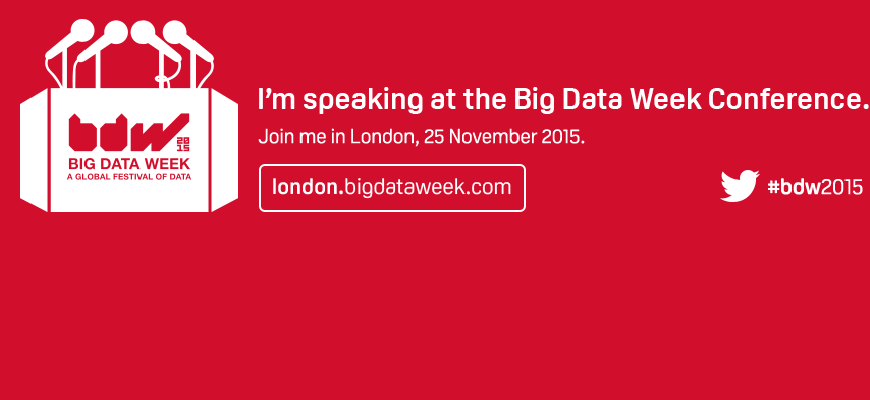Interview with Alan Grogan – Associate Partner Atos & Top 50 Data Leader in UK
This blog post is part of Big Data Week interview series.
Enjoy Alan’s thoughts on Big Data.
While Big Data is already a buzz term, what does it actually mean for you? (an old question with a fresh answer)
In my head I replace the work ‘Big’, with ‘Any’ and then do a sort of Star Trek thing by saying the “the future is out there, you just have to want to find it”. The world has sped up to such a pace now that organisations are surrounded in all types of data, Big Data/ Any Data offers them the chance to digitally transform as world markets evolves.
Is it more important to be data driven nowadays? If yes, why ( please use examples from your industry or your own case)?
Absolutely. World economies have rapidly changed due to technological advances in the past two decades. Now anyone with access to the internet can potentially start a future billion dollar company. Whether you work in healthcare (e.g. see NHS Scotland Digital Transformation), or you are a farmer (e.g. see John Deere Farm Forward), or even a global Non-Governmental Organisation (see Olympic Games Digital Transformation), the opportunity to eradicate gut-feel based decisions is available, and become far more agile and effective.
What are the main challenges a company encounters when starting to look at their data?
– Data Quality is still an easy target, but I see many business leaders are getting tired with this management excuse. There’s a saying I use, “If you aren’t going to use data to help your end customer, then no problem because somebody else will”.
– Detailed knowledge is a bigger factor. I’m lucky that I have taken some serious career risks by following new emerging trends and data initiatives, but so far this has paid off significantly for me and I now have a very large and extensive network covering start-up through to the senior management of the leading tech firms.
– Fear of failure culture does come into play quite a lot, but this works both ways. Those successful managers & leaders who have digital transformation experience under their belt can be worth their weight in gold (no joke), and they are replacing past management/ leadership who maybe have been resistant to change. No shareholders want their stock to go the way of Woolworths, and wisdom here means you will fail a few times before you successfully innovate.
– Where to start is thankfully a lot more upbeat than the above. My recommendation is to start small, gain experience gradually with the support of an expert and make incremental wins. Over time you can stand on your own two feet and then start taking on bigger, more stretching challenges.
Should a company own or rent the data?
A company will already own the most valuable data it needs, this is typically about 80% of the total. Rental is but one option as well as partnering and harvesting to fill the remaining 20%.
Do we still need data scientists with all the tools existing today for data cleaning, analysis, machine learning?
I think the vast majority of data scientists would themselves love this question to be answered with a negative response as it would then mean they are no longer getting asked to deal with the basics (such as data cleaning). There is a perplexity of choice with all the tools available, but they all hugely differ on a cost, quality and scope basis. The best approaches right now have a flexible technology architecture, data science expertise, a strong analytics framework, great data strategy and wise leadership.
Who should come and listen your talk in Big Data Week?
I’ll be talking about some exciting real world innovations that secretly have started to disrupt business models. My presentation is for anyone either with a technology or non-technology focus who is interested in digital transformation, disruptive technologies, strategic planning or IoT innovations.
BIO:
Alan has a signific ant background in delivering business value through data and analytics. He is recognized by IBM as one of the world’s Big Data Heroes, alongside professors at Oxford, John Hopkins and George Mason universities. His work and thought leadership has been covered in The Financial Times, The Banker, the Sunday Telegraph and other leading data and technology publications (e.g. ZDNet.com, CIO.com). He also has presented as a main speaker at Gartner’s Analytics & BI event. He is also one of the Top 50 Data Leaders in UK (Shortlisted top 5 for Data Knowledge & Integration).
ant background in delivering business value through data and analytics. He is recognized by IBM as one of the world’s Big Data Heroes, alongside professors at Oxford, John Hopkins and George Mason universities. His work and thought leadership has been covered in The Financial Times, The Banker, the Sunday Telegraph and other leading data and technology publications (e.g. ZDNet.com, CIO.com). He also has presented as a main speaker at Gartner’s Analytics & BI event. He is also one of the Top 50 Data Leaders in UK (Shortlisted top 5 for Data Knowledge & Integration).


